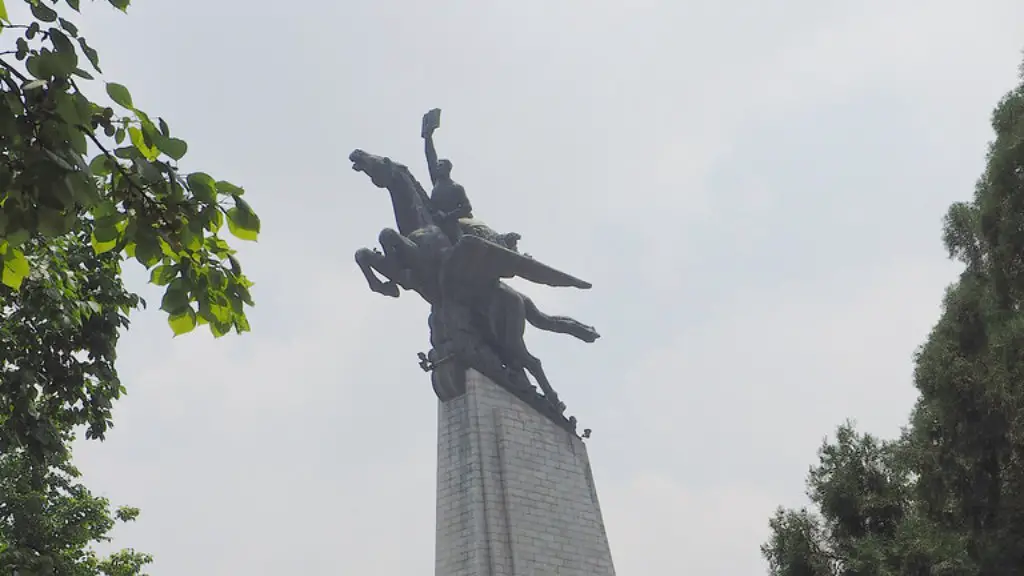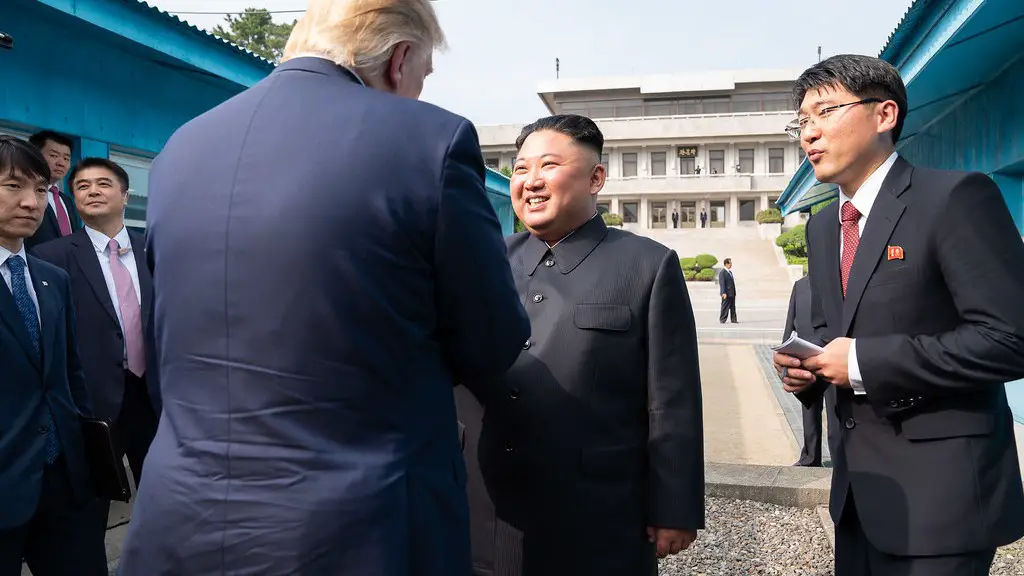The Political Situation in North Korea
The Korean Peninsula has traditionally been one of the hottest political spots in the world. North Korea is a self-declared nuclear power and has remained isolated from most of the international community, surviving off of its two largest allies, China and Russia. The United States has long advocated for change in North Korea, with the basis of its foreign policy centered on neutralizing North Korea’s nuclear capabilities. However, few prospects of a thaw in relations have emerged in recent years.
President Donald Trump has been a vocal critic of North Korea’s nuclear weapons program, and while he has stated he is open to dialog, he also made clear that military action remains an option. This has caused global concern, as a US-engaged conflict between the two countries could result in catastrophe – given the large nuclear stockpiles present in North Korea.
The Economic Impact of a War With North Korea
The economic implications of a war with North Korea would be far-reaching, and could potentially tip the entire global economy into a recession. North Korea is a heavily armed country with a large population, which makes it difficult for foreign powers to engage in traditional conventional-style conflict without potentially causing widespread damage to the region. Additionally, North Korea’s allies, China and Russia, are two of the most powerful countries in the world, and the potential for a conflict between those two nations cannot be overstated.
A war with North Korea would also reduce the global consumption of goods, as the impact of an armed conflict would likely be felt across multiple regions. This would result in a decrease in demand for goods and services, as well as a decrease in trade between nations. The decrease in global consumption would then cause a further economic downturn that could have devastating consequences.
The Human Cost of War
The human cost of war would be immense, as North Korea’s population is already highly vulnerable to starvation and disease. The destruction of infrastructure and facilities that are key to life support systems could displace millions and leave behind a humanitarian crisis. Additionally, military engagements would likely be concentrated in highly populated areas, resulting in yet further destruction of life and destruction of livelihoods.
In addition to direct casualties, the longer term costs of mental health, destruction of family units, and the disruption of education systems would all be felt for years to come, long after the war itself has ended.
The Potential for a Diplomatic Solution
It is important to remember that North Korea is a sovereign nation and has a government that is capable of negotiation. Despite the intensity of the tense political stalemate between the two countries, there have been a few attempts at finding a diplomatic solution. In this regard, the United States has expressed its willingness to enter into negotiations with North Korea, albeit these have largely been seen as unsuccessful.
Additionally, countries like Russia and China have expressed their own interest in a peaceful resolution, with both countries supporting the possibility of direct negotiations between the United States and North Korea. However, it is still unclear if a diplomatic solution is possible given the current state of relations between the two countries.
The Role of the International Community
The United Nations Security Council is the major international body tasked with addressing the North Korean situation. The Security Council has condemned North Korean actions and imposed sanctions on the country. However, the impact of these sanctions has been limited as North Korea continues to defy them and pursue its nuclear program. As such, it is unclear what role, if any, the United Nations and other international bodies will be able to play in the eventual resolution to the crisis.
Additionally, US allies in the region have largely been in a state of limbo when it comes to responding to the North Korean situation. South Korea, Japan, and Australia have all issued strong statements against North Korea’s actions, but have stopped short of taking any concrete action. All three countries, however, maintain a military presence in the region in case tensions escalate.
The Potential for a Lasting Peace
Given the high levels of tension, it is uncertain if a lasting peace will be achieved between North Korea and the United States. Although there have been some diplomatic efforts and some positive signs, the current climate of silence and mistrust still hangs over the Korean Peninsula. Additionally, North Korea has not indicated any shift in its position, making it difficult to tell if a diplomatic solution is possible in the near future.
Still, there are a number of international efforts underway to promote the peaceful resolution of this crisis, and a number of countries have demonstrated their support for such a solution. Whether or not these international efforts will be successful is yet to be seen, however it is important that political leaders continue to work together in order to bring resolution to the situation.
How World Powers Might React to a War With North Korea
The international community would likely respond to any conflict with North Korea with extreme reluctance. Countries such as China and Russia, due to their close ties to North Korea, would be unable to directly participate in a conflict, but would likely issue strong condemnation. Additionally, these countries could also be expected to impose their own economic sanctions, or threaten to do so, in an effort to influence the outcome of a potential conflict.
The United States, in particular, would face tremendous international scrutiny for any decision to take military action. The United States would likely draw criticism from both its allies and its adversaries, who would point to the potential for a humanitarian crisis and a devastating economic impact.
The Role of Nuclear Weapons
North Korea is known to have a number of nuclear weapons, and it is unclear how the use of these weapons could affect a potential conflict. North Korea has already demonstrated its willingness to demonstrate its large stockpile of weapons, with multiple test launches in recent years. As such, it is possible that North Korea could use its nuclear weapons in a conflict, as a way to deter potential adversaries or to gain leverage in any subsequent negotiations.
The potential for the use of nuclear weapons in a conflict is one of the most concerning aspects of any potential war with North Korea. As such, it is imperative that both the United States and North Korea work together to prevent a conflict, and to ensure a peaceful resolution to the crisis.
Implications of US-North Korea Relations
The United States’ relationship with North Korea, and the broader East Asian region, have consequences far beyond the possibility of war. The unresolved tensions between the two countries have been a source of geopolitical uncertainty, as well as a major source of worry for China and Russia. The potential for a conflict between the United States and North Korea could have direct implications for other countries in the region, as well as for the global economy.
Additionally, the United States’ actions towards North Korea reflect its foreign policy towards many other nations – particularly with regards to the use of sanctions and military action as levers of influence. The way the United States handles the North Korea situation will be closely watched, not only by its allies, but by its rivals as well.




